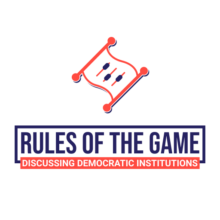
In this episode of Rules in Perspective I review the podcast episode 41 on direct democracy in Latin America, a discussion I had with Yanina Welp.
My three takeaways from episode 41:
- 0:50 Direct democracy is a powerful democratic institution.
- 2:41 Authoritarian regimes may use “the will of the people” to consolidate power.
- 7:14 The devil is in the details.
Listen to episode 41 and find the show notes here.
Yanina Welp’s research website.
It would be great to hear your opinion and feedback on this new format. If you want to send me an email, you can reach me at rulesofthegame.ddi@gmail.com. If you find my discussions interesting and you’d like to support my work, consider buying me a coffee at https://www.buymeacoffee.com/rulesofthegame
Related Episodes:
Related episode:
Let the People Rule with John Matsusaka | Ep. 31:
- Listen and show notes
- Youtube
Venezuela’s Democratic Erosion with Maryhen Jiménez | Ep. 27:
Chile – From Street Protest to a New Constitution with Claudia Heiss | Ep. 8:
Basic Principles of Direct Democracy with Stefan Schlegel | Ep. 5:
Full Transcript:
ules in Perspective #6 on Episode 41: Direct Democracy in Latin America
I’m Stephan Kyburz and I’m back after a break with the sixth edition of Rules in Perspective. Welcome back! Soon I am going to publish new episodes on the Rules of the Game podcast, so stay tuned.
These are my three takeaways from episode 41 on direct democracy in Latin America, a discussion I had with Yanina Welp. If you’d like to listen to the full episode, you can find a link in the show notes.
You find all editions of Rules in Perspective both as a video on my Youtube Channel and as a bonus episode on my podcast. It is important to mention that these are my personal comments and do not necessarily reflect the views of my guests or the organizations they work for.
Point 1: Direct democracy is a powerful democratic tool!
It can be used and misused to legitimize institutions and regimes. It is for instance used to ratify constitutions, as in the case of Venezuela in 1999, to confirm or veto laws, as in Uruguay, or even to collectively decide on the future of an authoritarian leader, as in the referendum on Pinochet’s term as president of Chile held in 1988.
What direct democracy allows for is a political discussion and reasoning beyond the parliament, beyond political parties and interest groups. By definition, it involves the public and puts a political issue on a pedestal. An issue gets more prominence in the public and people can make their mind up about a tangible decision to be taken. It helps political actors on the left and right to explain and justify why they are defending a certain policy. It thus can be a valuable mechanism that adds an additional stage of discussion and decision making to a political system.
I thought Yanina Welp’s quote of late Professor Andreas Auer, who was an expert in constitutional law was excellent, saying that – and a I paraphrase –:
“when an abrogative referendum is activated, it is because the system didn’t work well. But the system provides an extra opportunity for further collective discussion and decision making. And if the abrogation is approved, the system worked well, and if not, it also worked well, because it’s a confirmation of the law by the citizens.”
I think that’s a great way of thinking about the bottom-up referendum mechanism. It’s the possibility of vetoing a law already approved by parliament through a collective decision by the citizens.
Point 2: Authoritarian regimes may use “the will of the people” to consolidate power.
As Yanina Welp explains in the episode, there are plenty of negative examples of direct democracy being used by regimes to consolidate power or to impose their will on the people, rather than vice versa. Hence, how direct democratic institutions are employed is crucial.
The problem, that I see, is that many regimes are not representing the people well in the first place. Parliaments may be elected on electoral systems that give few options to the voters, that preserve the power of political parties in government, or that represent interest groups and wealthier people rather than the citizens. In such cases, distrust in institutions, dissatisfaction with political decisions and even anger is building up over time.
Such frustrations with the political system may then be used by opposition parties to implement a new regime. Yet, instead of making the political system more balanced, it swings to a new extreme. Political parties in Latin America have used that frustration with the system to introduce and implement new political authority, using direct democracy to get there.
Direct democratic decisions are used as an institutional mechanism to legitimize the capture of the political system and to overthrow an exclusive old regime. By exclusive I mean political structures and institutions that are designed to exclude large parts of the population from actual political power.
Now when parliament and the government are rather exclusive, and do not represent the citizens well, when political power is concentrated, it may seem to make sense to overrule parliament with the available institutional tools, like direct democratic decisions. Yet, the problem with those referendums is that they are often top-down, imposed by an emerging political party to legitimize a new exclusive political regime. Direct democracy is used as a strategic tool of potential authoritarian leaders. A usual characteristic of such top-down plebiscites is that they are often rushed through, leaving little time for the public to deliberate on the matter, and pitting the new regime against the old one.
The presidents in Venezuela and Ecuador activated top-down referendums to initiate the process of a constitutional reform and a change in the political regime, claiming that the decision of the people is above the law. As Yanina Welp describes in the episode, this is the notion of original constituent power that challenges delegated constituent power. The claim is to speak on behalf of the people, and of being empowered to control all political institutions.
In both cases, the process of constitutional reform was highly controlled by the new ruling parties, and they established the regulations that affected the work of the constitutional convention, and bent the rules where they saw fit. In both cases, bottom-up participation was hindered or even restricted, exemplifying that there was no real interest in actual citizens’ participation.
My take-away here is that it seems crucial to have the best possible inclusion of citizens’ interests both in parliament, but also in constitutional conventions. More proportional electoral systems may prevent exclusive political systems in the first place, and allocate political power more evenly across political actors and parties. A more balanced, and representative parliament can prevent extremist opposition forces, allowing for a smoother and more inclusive constitutional reform process. This again should prevent captured, disruptive direct democratic decisions that may put the country on an uncertain path.
Importantly, this is not to say that direct democratic decisions can be a powerful tool to overrule even a balanced, representative parliament, or to put pressure on the government to initiate a constitutional reform process, as was the case in Chile in 2020.
Point 3: The devil is in the details
When it comes to building strong and balanced institutions, the devil is in the details. Direct democracy is not always working in the interest of the citizens, because of weak institutional designs. Often it is the problem of top-down implementation or of having non-conclusive responsibilities over the whole bottom-up process. Different political bodies may have conflicting responsibilities in dealing with direct democracy.
If, for instance, the procedure to bring a bottom-up initiative to a vote is not well defined, it may become subject to political manipulation – as was the problem in Ecuador. The courts and parliament were disputing whether signatures should be counted first or whether the court should decide first if the topic of the referendum was constitutional or not. Besides, powerful courts may be used to prevent any controversial topics that are against the interests of those in government.
Clearly, there are better and worse choices in the institutional design of direct democracy. Bad institutional choices may trigger even worse political decisions. More exclusive political systems carry the potential for more radical reactions by citizens and opposition forces through direct democracy. While those strong opposition forces may be necessary to confront exclusive, undemocratic systems, the institutional response may put a country on a radically new, misguided trajectory. A new supposedly more democratic political elite, using the “will of the people”, may again push the country into a new type of dictatorship and non-inclusive political system.
For a detailed account of the cases of Bolivia, Chile, Ecuador and Venezuela, but also direct democracy in Latin America in general, I can highly recommend Yanina Welp’s research. You find the link to her website in the show notes.
That’s it for the sixth edition of Rules in Perspective. I hope you enjoyed it. New episodes of the Rules of the Game podcast are coming soon! Feel free to send suggestions for future guests and feedback or suggestions to rulesofthegame.ddi@gmail.com.
As always, I link to related episodes in the description below. I appreciate you’ve taken the time to watch Rules in Perspective. See you next time.
